December 2020
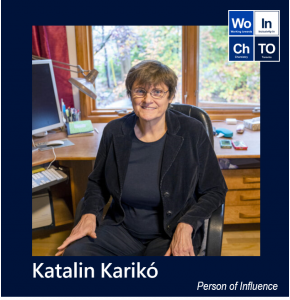
Katalin Karikó (1955 – present)
Dr. Katalin Karikó is a Hungarian biochemist whose research focuses on RNA-mediated mechanisms. In 1978, she began working on mRNA at the Biological Research Centre in Szeged but moved to the US after being terminated in 1985. She became a professor at the University of Pennsylvania, but was demoted when her mRNA research failed to gain financial support. In 2005, alongside Dr. Drew Weissman, she co-discovered a uridine modification that suppresses the immunogenicity of RNA. This modification paved the way for both the BioNTech-Pfizer and Moderna COVID-19 vaccines.
Despite demotions and grant rejections, she continued with her research and specializations which include mRNA based-gene therapy, RNA-induced immune reactions, and brain ischemia. Her research could be used to treat conditions ranging from strokes to cancer. Dr. Karikó is now a Senior Vice President at BioNTech RNA Pharmaceuticals.
November 2020

Akiko Iwasaki (1970 – Present)
Akiko Iwasaki is a Professor of Immunology, and Molecular Cellular and Developmental Biology at Yale University. Prof. Iwasaki earned her Ph.D. in Immunology from the University of Toronto in 1998, then completed her postdoctoral training at the National Institutes of Health in the USA before joining Yale University in 2000. She leads a team studying the mechanisms by which viruses are recognized by cells, and how adaptive immune responses are generated from innate immunity. Her group has focused on sexually transmitted infections, influenza, Zika, and most recently, SARS-CoV-2. Throughout the COVID-19 pandemic, Prof. Iwasaki has been a prominent figure in educating the public on how viral transmission occurs, and explaining results from recent publications about COVID-19. Her work has been recognized with several awards from medical associations, and she is an elected member of the National Academy of Sciences.
Twitter: @VirusesImmunity
October 2020
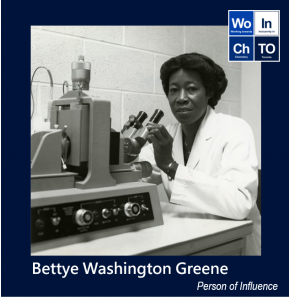
Bettye Washington Greene (1935-1995)
Born 1935 in Fort Worth, Texas, Dr. Bettye Washington Greene came to be a renowned chemist and community leader. Greene obtained her B.S. from the Tuskegee Institute in 1955 and earned her Ph.D. in Physical Chemistry from Wayne State University in 1962. She then went on to work for the Dow Company as a research chemist, being the first-ever African American female chemist to do so. Greene specialized in polymer science and served as an expert consultant for multiple research groups within the company. Her numerous scientific contributions include several patents related to latex, including a latex-based adhesive using a carboxylic acid copolymerizing agent and latex polymers with phosphates used as coatings. Greene also served as a founding member of the Delta Sigma Theta Sorority, a national public service group dedicated to working with African American women. She died in 1995.
July 2020

Shardé Davis (? - Present)
Dr. Shardé Davis is an Assistant Professor in the Department of Communication, and a faculty affiliate of the Africana Studies Institute and Institute for Collaboration on Health, Intervention, and Policy (InCHIP) at the University of Connecticut. Dr. Davis obtained her BA in Communication and Feministic Studies and her MA in Communication from the University of California Santa Barbara, and completed her PhD in Communication Studies (certificate in Gender, Women’s, and Sexuality Studies) from the University of Iowa.
Her primary area of specialization is interpersonal communication, with emphases in racial and gender identity, resistance, counter hegemony, resilience, intra/intergroup dynamics, and supportive communication. Her research examines how Black women communicate to invoke collective identity, erect and fortify boundaries in their homeplace, and backfill the necessary resources to thrive in American society. These interests are represented in her Theory, The Strong Black Woman Collective. David’s recent work on Black women’s communication about HIV has been supported with the 2018 American Postdoctoral Fellowship from the American Association of University Women and the 2019 Ford Foundation Postdoctoral Fellowship. Dr. Davis has published her research in various academic outlets, such as Communication Monographs, Human Communication Research, Journal of Social and Personal Relationships, Health.
She is the Co-founder of #BlackintheIvory (https://www.blackintheivory.com/), a hashtag that has started a movement of Black folkx in academia speaking their truth, demanding change and giving advice to younger scholars. Dr. Davis, alongside Joy Melody Woods, have also created the Bless a Black Graduate Student project where people can help cover graduate school expenses. You can find her on twitter @Dr.ShardeDavis. In her spare time, she volunteers in organizations and non-profits that support the overall livelihood of Black women and people of colour.
June 2020
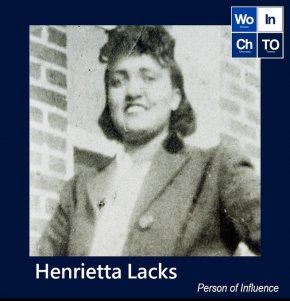
Henrietta Lacks (1920-1951)
Henrietta Lacks is the Black woman HeLa cells were named after. The HeLa cell line was the first “immortal” human cell line, capable of proliferating indefinitely outside of a living organism. This cell line has been vital in studying cell cloning and gene mapping, developing drugs and vaccines, as well as understanding the effect of zero gravity in space. At least three Nobel Prizes were awarded for work involving the HeLa cell line.
The first HeLa cells were removed from Henrietta Lacks without her knowledge at Johns Hopkins Hospital – one of the the few hospitals that permitted African American patients in America at the time – in 1951 during treatments for cervical cancer. Since 1951, HeLa cells have been mass produced, and created a multi-billions industry. To this day, the Lacks family has not received any compensation directly from the profits generated from the sale of HeLa cells. The harvest and use of the HeLa cell line, along with other cases where informed consent was absent, ushered in improved ethics in medical research.
For an extensive account of the lives of the Lacks family and the HeLa cell line, read The Immortal Life of Henrietta Lacks by Rebecca Skloot.
May 2020

Gita Ramjee (1956 - 2020)
Dr. Ramjee was a Ugandan-South African Scientist and a prominent researcher in the global fight against HIV/AIDS. She was the Chief Scientific Officer at the Aurum Institute, a not-for-profit AIDS/Tuberculosis research organisation as well as the Director of the South African Medical Research Council's Prevention Research Unit. She was also Clinical Professor of Global Health at the University of Washington and held an honorary professorship at the London School of Hygiene and Tropical Medicine, UK.
Ramjee’s research mission was to improve women’s health, that included advocating for a holistic approach to HIV prevention and reproductive health care. She emphasized that the focus should not only be on clinical trials but treatment accompanied by HIV prevention education and care (overcome socio-behavioral and cultural factors that impact women’s lives). In 2018, Ramjee was awarded the ‘Outstanding Female Scientist’ award from the European and Developing Countries Clinical Trials Partnership, for her work on finding new HIV prevention methods. She died in March 2020 from COVID-19 complications.
April 2020

Ben A. Barres (1954-2017)
Ben Barres was an American neurobiologist at Stanford University. He wrote “The Autobiography of a Transgender Scientist,” highlighting both his extensive research on the interaction between neurons and glial cells in the nervous system in addition to his experience in academia as both a female and a male. He obtained a Bachelor of Science in Biology from Massachusetts Institute of Technology (1976), a medical degree from Dartmouth Medical School (1979), and a residency in neurology at Weill Cornell Medicine. Beginning in 2008, he was Chair of the Neurobiology Department at Stanford University School of Medicine. He transitioned to male in 1997, and became the first openly transgender scientist in the National Academy of Sciences in 2013. He was a fierce opponent of gender discrimination in science. He wrote many articles and strongly worded emails highlighting the differences in treatment of females and males in academic environments. Read his book to learn more.
March 2020
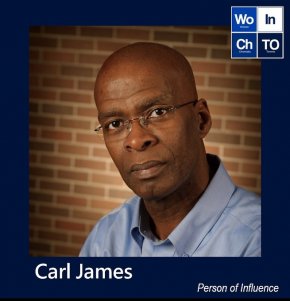
Carl James (? - Present)
Carl James is a Professor at the Faculty of Education, York University and holds cross-appointments at the Graduate Department of Sociology, Social and Political Thought. He holds the Jean Augustine Chair in Education, Community and Diaspora in the Faculty of Education and is also the Affirmative Action, Equity and Inclusivity officer. His research examines how equity, access, inclusivity, and social justice are taken up in educational institutions and regarding the educational and career experiences and ambitions of racialized and marginalized youth. In doing so, he seeks to address and move us beyond the homogenizing notions and representations of racialized people that account for their situation in society. His publications include the foundational text, Seeing Ourselves: Exploring Race, Ethnicity and Identity (2012), Equity Myth: Racialization and Indigeneity at Canadian Universities (2017); Life at the Intersection: Community, Class and Schooling (2012); Jamaica in the Canadian Experience: A Multiculturalizing Presence (2012).
James was elected as the Fellow of the Royal Society of Canada – Academy of Social Sciences (2012). His contributions to social equity and anti-racism education earned him an honorary doctorate from Uppsala University, Sweden. He is the recipient of many community and teaching awards, among them: Graduate Faculty Teaching Award (2017), York University; Black History Month Recognition, City of Markham (2014); Harry Jerome Professional Excellence Award, Black Business & Professional Association (2013); African Canadian Achievement Award (Education), Pride News Magazine (2009); William P. Hubbard Award for Race Relations, City of Toronto (2008). Furthermore, he is one of six advisors to the Minister of Education and Premier of Ontario.
February 2020
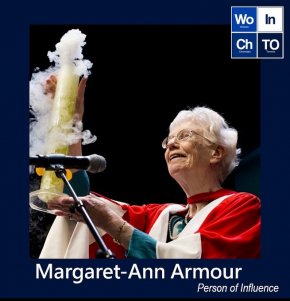
Margaret Ann-Armour (1939-2019)
Dr. Armour was a professor in the Department of Chemistry before becoming the first Associate Dean of Science (Diversity) at the University of Alberta. A tireless advocate for stronger representation of women in STEM, she is perhaps most known for founding Women in Scholarship, Engineering, Science and Technology (WISEST) at the University of Alberta in 1981. Since its inception, the WISEST programs have reached more than 15,000 participants with 85% of their Summer Research Participants pursuing undergraduate degrees in Science or Engineering. In 2010, Dr. Armour established the Canadian Centre for Women in Science, Engineering, Trades and Technology (WinSETT Centre). As the Dean of Diversity, Dr. Armour developed Project Catalyst, which is aimed at increasing the representation of women in faculty positions in the Faculty of Science. She received her BSc. and MSc. from the University of Edinburgh before completing her Ph.D. at the University of Alberta in 1970. She then completed her postdoctoral training under Prof. John Cadogan at the University of Edinburgh. She joined the Department of Chemistry at the University of Alberta in 1979, where her research focussed on establishing guidelines for proper disposal of hazardous waste. She authored the Hazardous Laboratory Chemicals Disposal Guide, which details proper disposal methods for hundreds of individual compounds and is a commonly consulted resource in many labs around the world.
January 2020
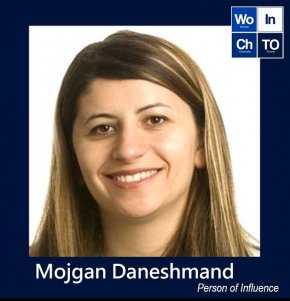
Mojgan Daneshmand (?-2020)
Dr. Daneshmand was a Professor at the University of Alberta and a Canada Research Chair specializing in Radio Frequency (RF) Microsystems for Communication and Sensing. Her group pioneered numerous works on non-contact microwave sensing and advanced satellite and wireless RF front end systems. Dr. Daneshmand was the recipient of numerous awards and recognitions over the course of her career. In 2016, Daneshmand was awarded the prestigious IEEE AP-S Lot Shafai Distinguished Mid Career Award for her scientific contribution in the field of microwave engineering and for her efforts as a role model for women in engineering. More recently, in 2018 she received the Martha Cook Piper Research Prize for outstanding promise in research. Dr. Daneshmand was an active member of Canada’s electrical engineering community and served as Editor for numerous journals and as co-Chair of her local IEEE chapter. Dr. Daneshmand, her husand, Dr. Pedram Mousavi, also faculty at the University of Alberta, and their two daughters, Daria and Dorina, were victims aboard the Ukrainian airliner that crashed last week. Their sudden passing has shocked Canada’s research community, which is still reeling from the loss. Dr. Daneshmand leaves behind a remarkable legacy as a leader, bold thinker, advocate, and mother and she will undoubtedly continue to serve as a role model for generations of young Canadian researchers to come.
